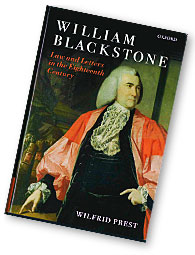FEATURE ARTICLE -
Book Reviews, Issue 49: May 2011
Wilfrid Prest is Professor Emeritus in history and law at the University of Adelaide. His is a most distinguished career as an historian of the law. His biography of William Blackstone, William Blackstone: Law And Letters In The Eighteenth Century, published in 2009, added to Professor Prest’s distinction. Blackstone biography, as a number of chapter authors in the present text, Blackstone and his Commentaries, make clear, has been one of the more poorly executed aspects of Blackstone scholarship. The Prest monograph and a shorter, self-published piece by English scholar, Ian Doolittle, published in 2001 stand out brightly among the few lack lustre alternatives that exist.
Blackstone and his Commentaries2 is the post production result of a seminar held in December 2007 in Adelaide. Although the Prest biography had not seen the light of day at that point, it is not surprising that Professor Prest was able to attract to mid-summer Adelaide a collection of the leading Blackstone scholars across a variety of specialist areas.
The authors include both biographers, Ian Doolittle and Professor Prest, himself. One of Prest’s colleagues at University of Adelaide, Carol Matthews, provides a fascinating chapter looking closely at Blackstone’s interest in and writing upon the subject of architecture and the way in which that subject influenced Blackstone’s legal writing.
Ian Doolittle’s chapter looks at Blackstone’s unlikely fascination with the radical Puritan politician and lawyer of a hundred years earlier, William Prynne, who had been involved in many disputes before, during and after the Civil War and again after the restoration of Charles II. Prynne was famous, inter alia, for having been imprisoned on numerous occasions and for having his ears clipped by shears in the pillory as a result of his dispute with powerful Anglican Archbishop Laud. Doolittle’s chapter explores the reasons for Blackstone having been an admirer and assiduous collector of Prynne’s writings. Doolittle explains that, despite their apparent religious and political differences (Blackstone was very much an Anglican) and a Tory conservative, Prynne and Blackstone also had much in common including their interest in antiquarian research and in championing the common law’s concern to protect the rights of English citizens. He also points out that Prynne’s politics in the latter part of his life veered towards a conservatism that was not dissimilar to Blackstone’s own political views.
Another Australian scholar, Thalia Anthony, of the University of Sydney [3] considers Blackstone’s famous passages from the Commentaries on the way in which British law considered suitable to local conditions becomes the law of settled colonies. Her essay points out the way in which decisions of colonial and Australian courts had ignored Blackstone’s qualifier that a settled colony must be unoccupied for the doctrine to apply. She also discusses the restoration of the qualifier, most famously, in Sir Gerard Brennan’s judgment in Mabo v Queensland (no. 2).4 Ms. Anthony, interestingly, challenges the High Court’s defence in Mabo of non-Indigenous Australian sovereignty which contrasted with the court’s sweeping away of the terra nullius fiction. Ms. Anthony argues that the sovereignty issue is equally unsupported by Blackstone’s discussion of the law of colonisation and argues that an ex-post treaty should still be sought to establish the Australian polity on a sound legal footing.
There are fifteen separate chapters in Blackstone and his Commentaries. Distinguished American contributors include Morris Cohen,5 Professor Emeritus, Professorial Lecturer in Law and former librarian at the Yale Law School. As one might expect of a librarian, his chapter focuses on the Blackstone bibliographies which are available and how they changed with more recent scholarship. Another American scholar, John V Orth, is a Professor of Law at the University of North Carolina. Professor Orth’s chapter discusses Blackstone’s views upon statutory construction as they emerge in the Commentaries.
The worth of Blackstone and his Commentaries, as a collection of essays, is not to be measured by the distinction of the authors of its various chapters although, in this case, it is difficult to imagine a more impressive collection of scholars covering such a broad range of expertise upon a single person’s life and work. Happily, the quality of the writing, in this case, matches the outstanding reputations of its respective authors.
Postscript
In my review of Professor Prest’s biography of Blackstone, I pointed out that my generation of lawyers, despite our now advancing age, post-dated those who had read and studied the Commentaries as part of their undergraduate courses. I admitted to not reading a single word of the great man’s writing outside of references in decisions such as Mabo.
I have happy to advise that, due to a combination of the Gutenberg Project and being in possession of an iPhone 4, I have downloaded the Commentaries and have read a small number of pages of Blackstone’s introduction to the work. Equally happily, I can say that his writing style is indeed elegant and I may yet devour the whole work.
In the meantime, I happily recommend Blackstone and his Commentaries as a collection of essays each of which is full of interest and which, taken together, provide an important guide to Blackstone’s historic contribution and his continuing relevance for the development of the law.
Stephen Keim
1. Hart describes itself as the largest independent legal publisher in the United Kingdom. It was established in 1996. Its website may be found here.
2. The publisher’s web page for the book may be found here.
3. Ms. Anthony is now a senior lecturer at the University of Technology Sydney.
4. (1992) 175 CLR 1, 26
5. Professor Cohen passed away on 10 December 2010.



